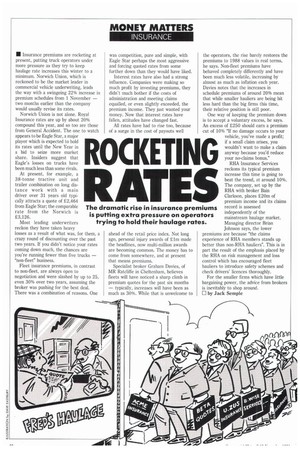MONEY MATTERS
Page 42

If you've noticed an error in this article please click here to report it so we can fix it.
INSURANCE
• Insurance premiums are rocketing at present, putting truck operators under more pressure as they try to keep haulage rate increases this winter to a minimum. Norwich Union, which is reckoned to be the market leader in commercial vehicle underwriting, leads the way with a swingeing 22% increase in premium schedules from 1 November — two months earlier than the company would usually revise its rates.
Norwich Union is not alone. Royal Insurance rates are up by about 20% compound this year, and so too are those from General Accident. The one to watch appears to be Eagle Star, a major player which is expected to hold its rates until the New Year in a bid to seize more market share. Insiders suggest that Eagle's losses on trucks have been much less than some rivals.
At present, for example, a 38-tonne tractive unit and trailer combination on long distance work with a main driver over 31 years old typically attracts a quote of £2,464 from Eagle Star; the comparable rate from the Norwich is £3,126.
Most leading underwriters reckon they have taken heavy Losses as a result of what was, for them, a crazy round of discounting over the past two years. If you didn't notice your rates coming down much, the chances are you're running fewer than five trucks — "non-fleet" business.
Fleet insurance premiums, in contrast to non-fleet, are always open to negotiation and were slashed by up to 25, even 30% over two years, assuming the broker was pushing for the best deal. There was a combination of reasons. One was competition, pure and simple, with Eagle Star perhaps the most aggressive and forcing quoted rates from some further down than they would have liked.
Interest rates have also had a strong influence. Companies were making so much profit by investing premiums, they didn't much bother if the costs of administration and meeting claims equalled, or even slightly exceeded, the premium income. They just wanted your money. Now that interest rates have fallen, attitudes have changed fast.
All rates have had to rise too, because of a surge in the cost of payouts well
ahead of the retail price index. Not long ago, personal injury awards of Lim made the headlines, now multi-million awards are becoming common. The money has to come from somewhere, and at present that means premiums.
Specialist broker Graham Davies, of MR Ratcliffe in Cheltenham, believes fleets will have noticed a sharp climb in premium quotes for the past six months — typically, increases will have been as much as 30%. While that is unwelcome to the operators, the rise barely restores the premiums to 1988 values in real terms, he says. Non-fleet premiums have behaved completely differently and have been much less volatile, increasing by almost as much as inflation each year. Davies notes that the increases in schedule premiums of around 20% mean that while smaller hauliers are being hit less hard than the big firms this time, their relative position is still poor.
One way of keeping the premium down is to accept a voluntary excess, he says. An excess of £250 should earn a premium cut of 10% If no damage occurs to your vehicle, you've made a profit; if a small claim arises, you wouldn't want to make a claim anyway because you'd reduce your no-claims bonus."
RHA Insurance Services reckons its typical premium increase this time is going to beat the trend, at around 10%. The company, set up by the RHA with broker Bain Clarkson, places £20m of premium income and its claims record is assessed independently of the mainstream haulage market. Managing director Brian Johnson says, the lower premiums are because the claims experience of RHA members stands up better than non-RHA hauliers". This is in part the result of the emphasis placed by the RHA on risk management and loss control which has encouraged fleet hauliers to introduce safety schemes and check drivers' licences thoroughly.
For the smaller firms which have little bargaining power, the advice from brokers is inevitably to shop around.
0 by Jack Semple




























































































































